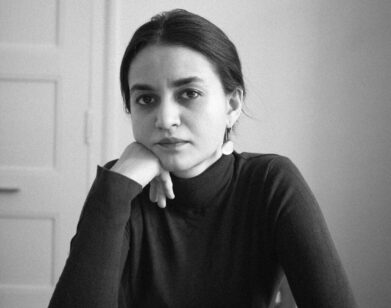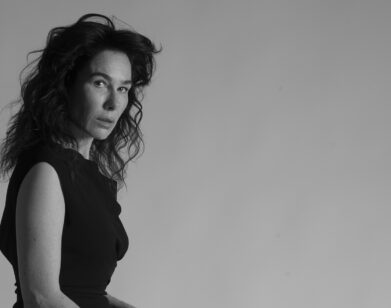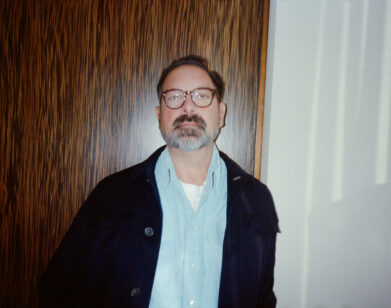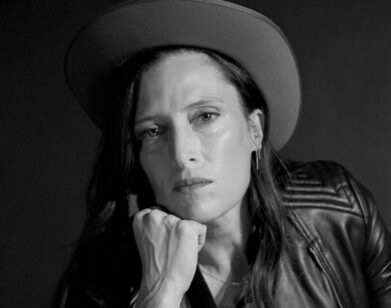Arnaud Desplechin’s Golden Years
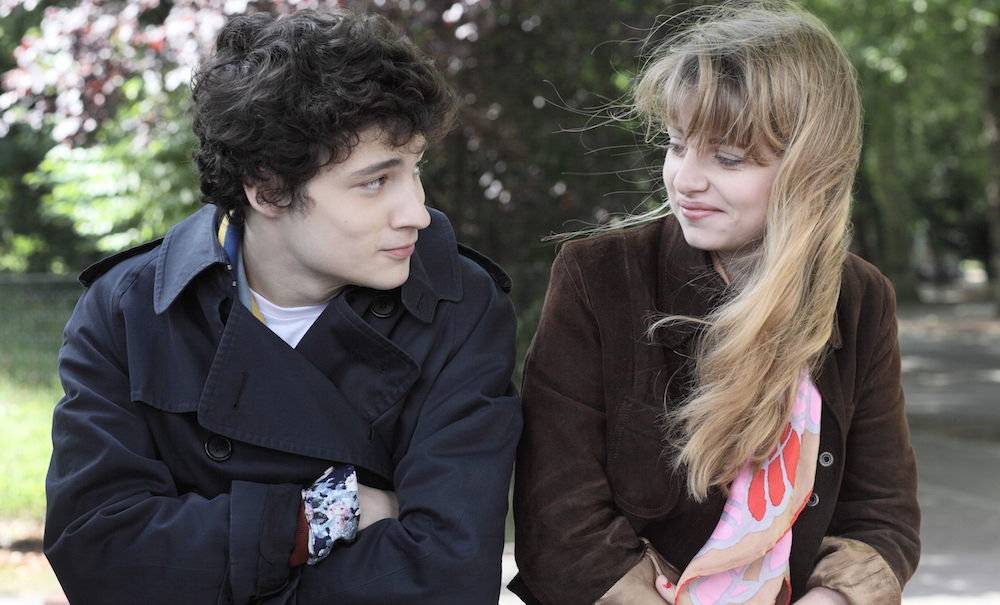
QUENTIN DOLMAIRE AND LOU ROY-LECOLLINET IN MY GOLDEN DAYS, A MAGNOLIA PICTURES RELEASE. PHOTO COURTESY OF MAGNOLIA PICTURES.
Divided into three interconnected parts, Arnaud Desplechin’s My Golden Days is a roving account of the amorphous complexities of memory and identity. The latest film from the acclaimed humanist French writer-director takes the form of an assemblage of Desplechin’s past and present preoccupations: Love and loss, past follies, and searing sentiment all get their due. It’s a prequel, in spirit, to his 1996 film My Sex Life…or How I Got into an Argument, the sexual saga of Paul Dédalus (Mathieu Amalric), a young Parisian academic, and his ever-complicated romantic entanglements.
Yet with My Golden Days, Desplechin disconnects the narrative kinship of the two films into a rosy-hued chronicle of youthful infatuation and middle-aged ennui, depicting Paul (Amalric, again) in adulthood, looking back on his coming of age in the 1980s, and his teenage affair with a young woman (Esther, played by Lou Roy-Lecollinet) that continues to plague him. Newcomers Roy-Lecollinet and Quentin Dolmaire (who takes on the role of the young Paul) charge the film with a fresh earnestness that doesn’t veer into nostalgia; Depleschin’s dexterous use of period details (music, especially) lend the flashback sequences a richly textured depth. But the strength of the film is that while Desplechin remembers, deeply, he doesn’t wallow too much in the past. Rather, he uses it to describe the present.
Interview spoke with Desplechin during New York Film Festival last year in anticipation of the film’s release, today.
COLLEEN KELSEY: Why, at this point in your life and your career, did you want to look at a coming of age story?
ARNAUD DESPLECHIN: At this point of my life, I thought, “What I’m writing has no value to me if it’s not useful for young actors. If another generation doesn’t have the use of my lines, my lines don’t mean a thing to me.” So, would I be able to write for young guys and girls? Usually I would use my own material, my own memories, my own ways in the dialogues. I have a niece, I think she’s your age or something like that. I’m a terrible uncle, you know, I’m boring. If I speak, I think I speak too much. If I don’t speak, I think, “Arnaud, you’re so gloomy.” It’s difficult for me to be natural in front of another generation. My dream was to be able to build an artistic friendship with a guy or a girl who’d be 30 years younger than me, and to be equal. That was the beauty of this film.
KELSEY: How did you decide how connected or disconnected to make this film from My Sex Life…?
DESPLECHIN: There was just one thing where the films are connected. As I was saying to Mathieu on My Sex Life…, we invented a very common hero that doesn’t have many powers. In a way, it’s funny to say prequel. I love popular movies, so I thought, it’s funny, the idea of making a prequel of a previous film. But the thing that I didn’t explore at all in My Sex Life… was this guy, who’s so shy, so unimpressed with himself, meeting this girl who’s so different from him, and to film the meeting of these two guys who perfectly match and don’t get along. This paradox was the beauty of their life story, and this was not in My Sex Life… It was new material. So I didn’t try to be faithful to the previous film. Plus, I was working with young actors. They asked me off-screen, “Do we have to see your films?” “No, come on, see the films of your generation, I don’t care that you see my films.” Actually, I think they did their homework and they saw My Sex Life… a few times, you know. But I never asked them; we never discussed my previous films together. I asked them to invent something new.
KELSEY: Did you find when you were working with these young actors that they were able to relate to the experience of someone their age, 20 or 30 years ago?
DESPLECHIN: Oh yeah. I’m mentioning this wonderful actress, Lili Taieb, who’s playing playing a small part in the film, the sister. She’s using these lines which come from Chekhov, “But dad, why am I ugly?” Suddenly she was doing something so bizarre and so violent. It’s heartbreaking. She felt she was able to speak about herself. That was the beauty of it. I remember the closeness we had with the young actress playing Esther at the very last moment of the film, when she’s alone, and this girl who has been so invulnerable, suddenly, love arrives, and she realizes that she is vulnerable. When Paul isn’t in her life, suddenly she feels miserable and ugly. To film this paradox, and the closeness that we had during all these monologues and letters and cries and whispers that she’s sending when she’s writing to Paul, it was really a pure moment of cinema.
KELSEY: Was making this film particularly emotional or nostalgic for you?
DESPLECHIN: It’s not nostalgia, but it was really moving. With the young Paul and Esther, there were moments that really moved me so much. When she’s coming back, and she’s betraying him with [Paul’s friend] Kovalki and saying, “Okay, I’m a slut,” there was an emotion to film that. So intense. I think the performance of Mathieu Amalric is really amazing. This moment when he’s writing to Kovalki and saying, “Okay, perhaps I had this stupid dream in my life. The only thing which could cure me is to be sure that in a way or another I’ve been good for her,” I’m crying like a stupid kid, because the performance he’s giving is too much. It’s too real. It was moving, but it was not like nostalgia, in the sense it was not from the past. It was a present moment. Even if I’m using my past, it was moments that are very present in depicting my life today, even if I’m not from the same generation.
KELSEY: Let’s talk about Mathieu. How has your working relationship with him evolved or intensified throughout your collaborations?
DESPLECHIN: It has changed. I love to surprise, you know, there is a pressure on each film. I have to prove him that we are doing something new. And I know, because he’s saying that it would be a shame to propose you, and the audience, and the critics the same character that we already did. I think that it’s really fair. “Yes, Arnaud, but we have to surprise them.” It’s good, it’s challenging. As Mathieu says, there is the fear when it’s a long love story, it’s a fear of disappointing the partner. We did so many things together, how can I surprise him, you know? I was mentioning this moment, of the letter. I think I surprised him with my way of shooting it, because it was not planned. He surprised me with the scene with the anger that he has, when he’s in the cafe with this friend at the end, “My rage intact; my love intact!”
KELSEY: How closely does the psychology of Paul in My Golden Days align with the Paul of My Sex Life…? Or does it not at all?
DESPLECHIN: It was separate. Sure, there is a link, but the link is in the writing process. And as I never asked to the young actors to look at My Sex Life.., I never asked Mathieu to work on his previous character. I thought it would be—
KELSEY: Too self-indulgent?
DESPLECHIN: Or something like that. No, we had to invent something new, and I think there is something new, which is not at all in My Sex Life… It’s Mathieu who’s bringing that, and the writing, but Mathieu is impersonating it. It’s a new theme: the exile. When you have no one. When you have no country any longer. In all the stories told by the film, it’s the story of this boy who doesn’t have a home, who wants to leave. He wants to leave France, he wants to leave Roubaix for Paris, he wants to leave his mother house to his grandma’s, he wants to leave for Russia. This appetite for leaving everything and ultimately, when you can see him in Paris you alone and walking on the bridge, he lost everything except Esther. That was his country. His country was a woman. It was not a proper place; it was a person. I think that is something new that Mathieu invented.
KELSEY: He’s also a bit of an exile in terms of not just place, but to himself, and his own memories. How critical to Paul’s character is it that he’s always the one moving, but the people that are important to him stay in a fixed place?
DESPLECHIN: It’s true. It’s also this idea that this man, Paul, at any of his age, being Mathieu or being acted by Quentin Dolmaire, it’s a guy that thinks he’s shallow, that he’s nothing. He’s skeptical, he thinks, “Do I exist? I don’t exist enough. I’m afraid. I’m in exile, I’m not inhabiting anywhere.” You see him as a young student, not having a bed, not having a room, not having a thing; he’s floating. Suddenly he meets this woman who exists, who is a pure block of existence, who’s saying, “I do exist.” She’s grounding him. She’s giving him an address. It’s almost like he’s hitting against a brick wall and she is the wall. It hurts, but it’s good, because you feel alive.
MY GOLDEN DAYS IS OUT IN LIMITED RELEASE TODAY.


